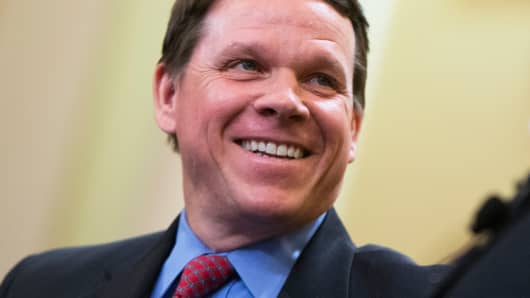This analysis isn't just an observation from "the right." Jonathan Turley, a liberal law professor from George Washington University, who voted for President Obama, wrote in a Los Angeles Times op-ed on Sunday, titled "The President's Powergrab," that "No one in our system can 'go it alone' — not Congress, not the courts, and not the president."
(Read more: Democrats more vulnerable ahead of election: Poll)
The frequent delays and ignoring of various provisions of the health law is a high-profile example of failure to follow the law. But, there are many other instances of this insidious activity, including at the agency charged with helping America's small businesses.
The Small Business Administration's (SBA) core missions are to help provide small business access to capital, promote federal contracting with small firms, and provide entrepreneurial counseling — all positives which small businesses need to create jobs. However, when you look at the SBA, the limits are being pushed with the creation of multiple "pilot" programs, which are activities and initiatives that are created without congressional or industry endorsement, input, or oversight. Without proper public debate and involvement from the legislative branch, these programs are more susceptible to inefficiency, waste, and duplication.
(Read more: Wall Street still 'hearts' Obama)
In 2012, the Government Accountability Office (GAO) found overlap and duplication among 52 programs at the USDA, Commerce, HUD, and SBA meant to support entrepreneurial endeavors. Despite this finding, the SBA has recently tried to establish several new entrepreneur assistance programs, as well as pilot programs under the 7(a) Loan Program, specifically the Community Advantage and Small Loan Advantage programs. The stated objectives of the programs are worthy, but they were established without direction from Congress or input from lenders or borrowers, and because, in part, due to their isolationist method of creation, the programs have suffered internal problems and inefficiencies that have increased the subsidy rate of the 7(a) Loan Program, which has been paid by the taxpayer.
Despite the overwhelming evidence of duplicative and fragmented programs, the SBA asked for a funding increase in their fiscal year 2015 budget of more than $1.6 million for new entrepreneurial development programs, with no congressional approval — the same type of programs the 2012 GAO report found to be riddled with wasteful spending.
It is also surprising that the SBA continues to look for new pilot programs to start, considering they are shirking so many other responsibilities. For example, its $100 billion loan portfolio is at serious risk due to needed upgrades to its COBOL-based technology systems. The SBA began the modernization process almost nine years ago and has received millions in funding, yet it is still incomplete and fraught with examples of mismanagement, according to the GAO. A modern loan-accounting system would enable the SBA to manage its loan portfolio in a manner that protects the taxpayer, mainly by improving returns on recoveries of defaulted loans. That should be a priority. In addition, the SBA still hasn't updated their procurement operations to reflect the small business contracting reform that Congress passed, and the president signed into law, two years ago.
(Read more: What the minimum-wage debate says about the economy)
Rather than constantly expanding government, and the frustrating bureaucracy that comes with it, the SBA should focus on updating its technologies, implementing current law, and improving the limited amount of programs that are authorized under the law and actually work for taxpayers and businesses.
The House will vote on legislation this week that will allow Congress to challenge executive overreach in the courts, expedite judicial review of those challenges, and increase accountability and transparency. But as we await Senate confirmation of a new SBA administrator, I implore the administration to re-evaluate its mission and operations. Saying that you are advocating on behalf of small business does not grant a license to spend at will on more and more programs without congressional input, oversight, or statutory authority. The SBA should be redirected to focus on its core missions of capital access, contracting, and counseling, while reducing duplication, overlap, and wasteful spending. Doing so will greatly improve its ability to better advocate for small businesses.
— By Sam Graves
Sam Graves (R-Mo.) is chairman of the U.S. House of Representatives' Small Business Committee and U.S. representative of the 6th congressional district of Missouri. Graves, who is a sixth generation family farmer, has served in Congress since 2001 and served as chairman of the Small Business Committee since 2011. Follow the committee on Twitter @SmallBizGOP.


